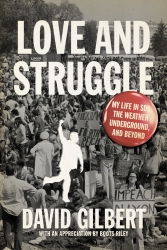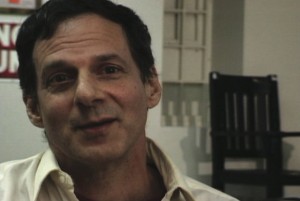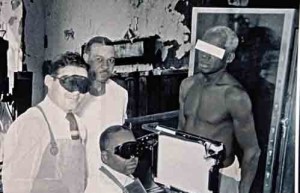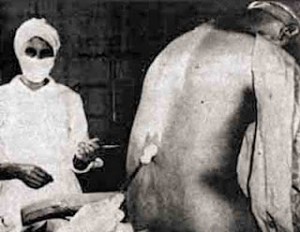Podcast: Play in new window | Download
Updates:
- Mumia Abu-Jamal Appeal Rejected
- Supreme Court Ruling Allows Strip Search For Any Arrest – Targets Minorities
- ICC Declined Investigation Into Operation Cast Lead
————-
Love and Struggle: My Life in SDS, the Weather Underground, and Beyond
Love and Struggle: My Life in SDS, the Weather Underground, and Beyond is the title of a new book chronicling the militant career of radical activist David Gilbert. As many listeners may know David Gilbert was the founder of SDS, Students for a Democratic Society at Columbia University and he helped build an underground resistance to war and racism known as the Weathermen, one of the most radical movements in the United States. Gilbert was incarcerated because of his involvement in the 1981 Brinks robbery that resulted in four deaths. His book is a very personal account told from first person that marks his various stages as a liberal, a radical and then revolutionary. Gilbert has been in jail for the past 3 decades and readers get a rare glimpse into this retrospective.
- David has been in prison my whole life. As a teenager and activist I needed a mentor.
- I started writing political prisoners and David Gilbert was one of them.
- He was patient and gracious in answering my many questions. Helping me think about race and empire and my role in the world.
- I think he’s done a phenomenal job of walking us through the thought process.
- In his own case, David was reluctant to write about prison conditions, and Love and Struggle is not at all a prison memoir.
- I think its quite rare to have a prisoner write a book that’s not about prison conditions.
- The humanizing effect he writes about is not about the abuse he’s suffered inside. Video with readings
—–
Naomi Jaffe:
- David and I met when we were both graduates at the New School in New York, in ’67 it must’ve been.
- We were co-founders of New School SDS, we were fire-y young students together for several years in New York.
- David wrote (Love and Stuggle) because young people were asking him, what the lessons were from that period. Lessons- the way that our generations have much to learn from each other, passing a legacy from generation to generation.
- There’s a huge amount on racism and white supremacy and being a white ally, an analysis of how you move in a way as a white person to oppose white supremacy.
- To me, its not only the connection but learning from who you learn from.
- His (David Gilbert) ability to figure out that the clearest analysis of an oppressive system comes from people who are on the receiving end of it.
- David says Malcolm X opened the eyes of his generation.
- People are beginning to read it for the transfer of information from one generation to another.
- I think one of the lessons is how has David survived as a prisoner.
- He wrote an earlier book which was a collection of essays called No Surrender. It meant; how do you maintain your spirit?
- From the point of view of the Occupy Movement, the ability to center the narrative of people of color and of the most oppressed people.
Guest – Dan Berger, a writer, activist, and the George Gerbner Postdoctoral Fellow at the University of Pennsylvania. He writes about race and postwar American social movements. His latest book is The Hidden 1970s: Histories of Radicalism
Guest – Naomi Jaffe, writer and prison activist who helped to proof read Love and Struggle, add political and other detailed commentary.
————-
Guatemalan People Experimented On And Used As Test Subjects
We discuss a very shocking story today, about tests conducted by the U.S. Public Health Service on more than five thousand individuals in Guatemala. From 1946 to at least 1953, more than a thousand people were deliberately infected with sexually transmitted diseases. The victims included prisoners, soldiers, the mentally ill and commercial sex workers none of the had consented to this egregious treatment.
In November 2010, President Obama demanded an investigation regarding what he called the “intentional infection of vulnerable human populations.” He noted that “The research was clearly unethical.” President Obama, Secretary Clinton, and Secretary Sebelius have publicly apologized. Last fall, the Presidential Commission for the Study of Bioethical Issues released a report on its investigation into medical experimentation that took place in Guatemala. The Commission called these experiments “especially egregious”.
It’s important to note that the experimentation in Guatemala was overseen by the same lab — the Public Health Services Venereal Disease Research Laboratory — as the STD experiments at Tuskegee. In fact, some of the same researchers were involved and some of the same diseases. In the Tuskegee matter, the parties reached a $10 million settlement in 1974 in which the United States promised to provide medical benefits to the participants and established the Tuskegee Health Benefit Program (now the CDC’s National Center for HIV/AIDS, Viral Hepatitis, STD and TB Prevention).
Meanwhile, a class action lawsuit was filed on behalf of 8 individuals who claim to have been victims in the Guatemalan case, spouses or descendants of victims and is now moving its way through federal courts.
- There were experiments going on in Terra Haute, Indiana and Tuskegee, Alabama.
- There were ethical limitations with what they could do within the United States.
- The US medical researchers went down to Guatemala and targeted vulnerable populations including ophans, mental health patients, prisoners, soldiers; people who never gave consent to be part of these experiments.
- They used different methods, bringing fluid out of the spinal column, mixing that with Syplitic material and injecting that back into the person. Mixing material from genitalia into water and having people drink it.
- The populations that they were working with were in institutions already.
- Susan M. Reverby is the Marion Butler McLean Professor in the History of Ideas and Professor of Women’s and Gender Studies at Wellesley College, and an historian of American women, medicine, public health and nursing.
- There wasn’t a known treatment for syphilis at the time and they wanted to watch the course of the disease, what does it do to the human body left untreated.
- But when penicillin became a known remedy for syphilis, the fact that it was withheld, and that people were intentionally misled.
- In Tuskegee, you have a population that’s not as well protected, not respected, this pre-civil rights movement.
- We’ve brought several claims, some under International Law and some as Constitutional violations.
- International law claims, look at specifically the non-consensual human medical experimentation and also bring a claim of cruel and degrading treatment.
- The statute that we’re proceeding under, the Alien Tort Statute is one you can’t use in court unless you clear the hurdle of having a violation of international law.
- Given the nature of the disease this is something pass on to your spouse, and potentially to your children.
- The defendants in this case are the US Government and the Pan American Health Organization which is the subsequent organization from the Pan American Sanitary Health Bureau.
- They’re arguing that they should be substituted under the Westfall Act for any individual defendants.
- When you substitute the US Government you’re then proceeding under the Federal Tort Claims Act.
- In sum, you can only sue the US Government when the US Government gives you permission to do so.
- Change.org link
Guest – Piper Hendricks, an attorney working on the Guatemalan case, she has served as the International Justice Project Director of The World Organization for Human Rights USA in Washington, D.C
————————————————————–



